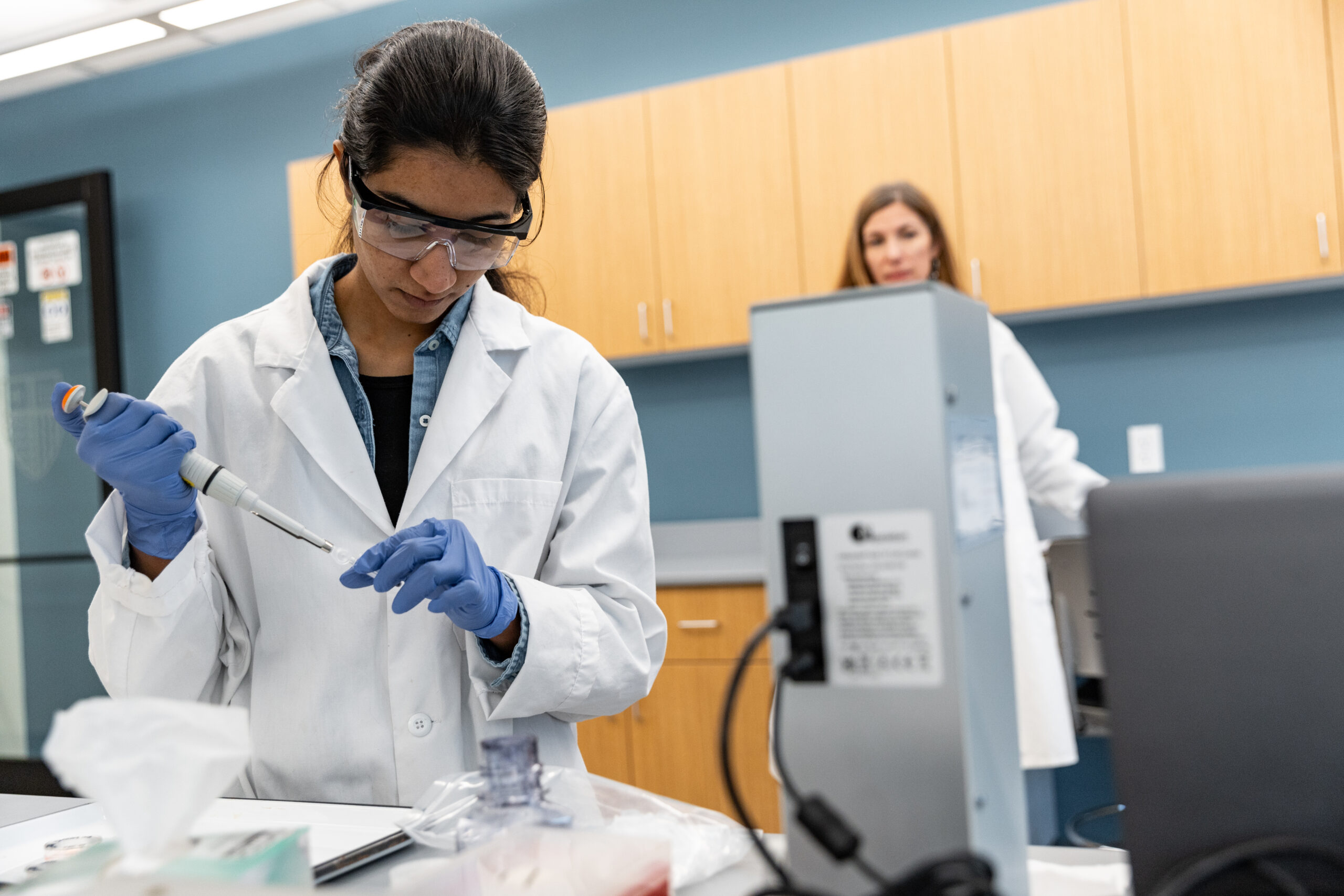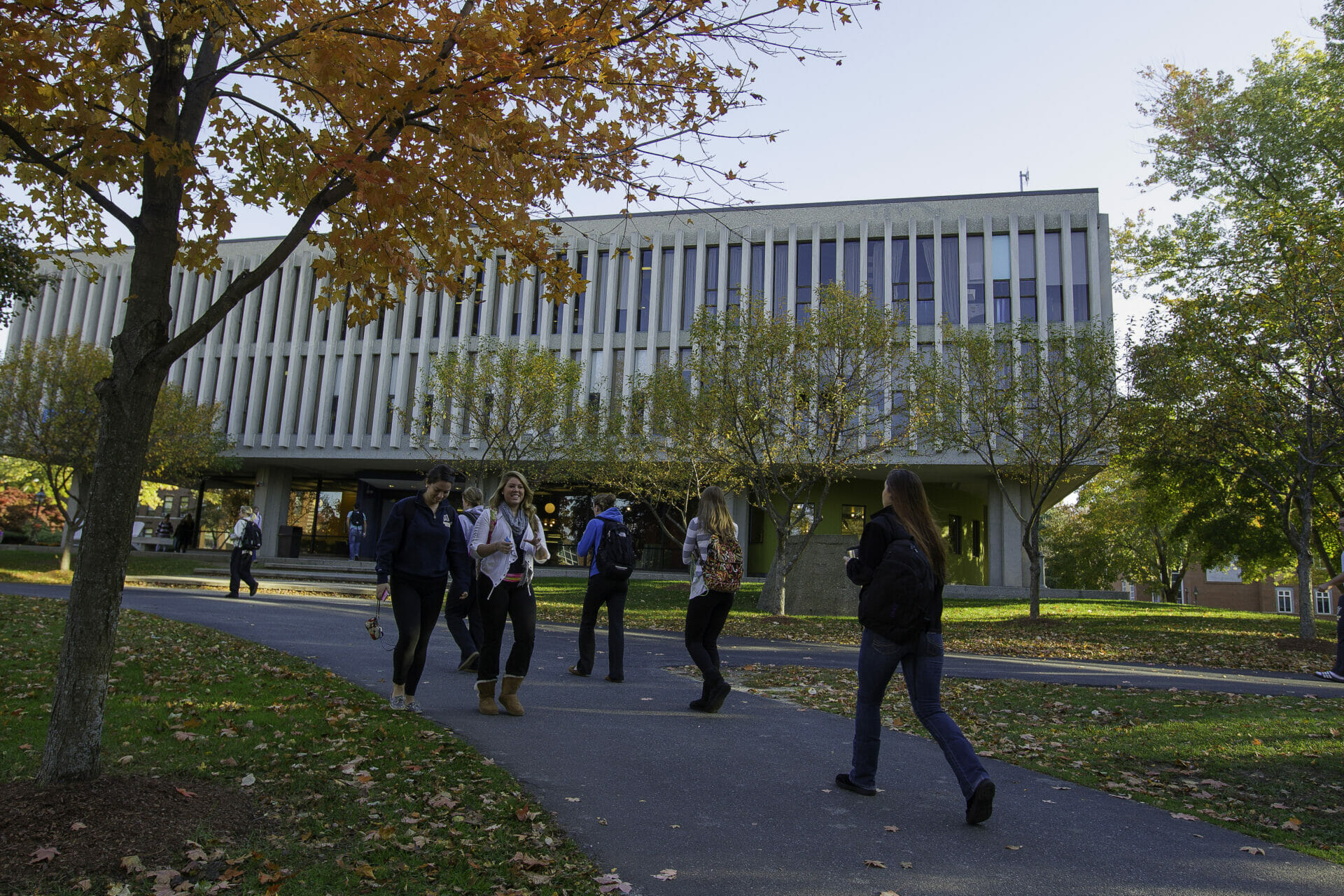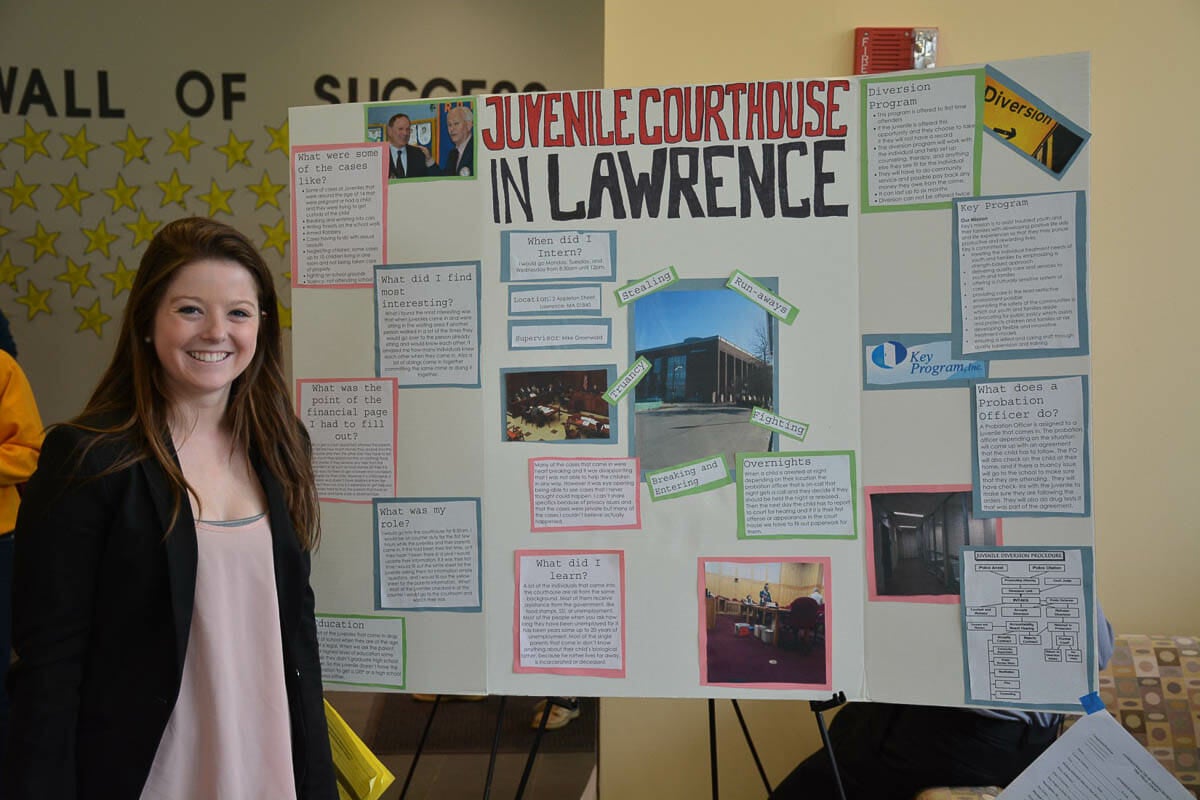Bachelor of Arts (B.A.) in Criminology and Criminal Justice
100% of students participate in a semester-long internship at agencies like the Department of Homeland Security and the Department of Children and Families.
As a criminology and criminal justice major, you’ll gain a deeper knowledge of what causes crime and how to improve criminal justice policies. You’ll be well prepared for a career in law enforcement, corrections, counseling or criminal investigation.
Criminology and Criminal Justice Degree at a Glance
Program Type
Major
Mode of Study
On Campus
Internship
Guaranteed
Est. Time
4 Years
Start Terms
Fall, Spring
Cost
School
Accreditation
Tell Me More About Merrimack's Criminology and Criminal Justice Major
"*" indicates required fields
The Criminology and Criminal Justice Major
As a criminology and criminal justice major, you’ll explore lawmaking, lawbreaking and the social consequences of both. Bonus? Your courses will give you an inside look at the broader sociocultural, political-economic and historical forces that impact people’s lives.
What You'll Study
At Merrimack, our criminology and criminal justice students will study a variety of subjects to prepare for future careers. Key areas include:
The Criminal Justice System
Society and Law
Corporate and White-Collar Crime
Cybercrime
Rural Crime
Global Justice
Skills You'll Learn
Level up your skills in the classroom, so you’re the most prepared for your future career!

Criminology and Criminal Justice Courses You'll Take
The Criminal justice system
CRM 1100
This course provides an overview of the US Criminal justice system, with a focus on this case processing of adults. Students will gain a thorough understanding of the historical development of the criminal justice system, how police, courts and the correctional system operate.
Society and law
CRM 3000
The larger goal of this course is to gain an understanding of the significant relationship which law plays in our everyday lives and its role in society. Throughout the course, we will address several questions: How, when, and why do laws arise? How do legal systems reflect the values of the society?
forensic criminal investigation
CRM 3700
Students examine the methods, strategies, objectives, and processes employed by criminal justice practitioners through mock investigations and trials. Students will also consider the ethical obligations that those who are vested with the public trust undertake as criminal investigators.
See All Courses & Options Available to Criminology and Criminal Justice Majors
Criminology and Criminal Justice Major Requirements
General Education Requirements
In addition to the major requirements below, you will also need to complete Merrimack’s general education requirements. To see more details about the major, please visit catalog.merrimack.edu.Criminology and Criminal Justice, B.A.
Minimum number of credits required to graduate: 124
Minimum cumulative GPA required to graduate: 2.0
Minimum number of credits to complete the major: 44
School: School of Education and Social Policy
Department: Criminology and Criminal Justice
Major Requirements
The major requires completing a minimum of eleven courses. The first courses for all students in the major are
and . These prerequisite courses give students baseline knowledge for all courses taught in the major.Required Courses
The following six courses are required:
- CRM 1000 - Introduction to Criminology
- CRM 1100 - The Criminal Justice System
- CRM 3000 - Society and Law
- CRM 4000 - Research Methods in Criminology and Criminal Justice
- CRM 4500 - Statistics in Criminology and Criminal Justice
- CRM 4800 - Criminology and Criminal Justice Internship
- OR
- CRM 4850 - Criminology and Criminal Justice Internship II
Required Electives
Choose five elective courses from the following:
- CRM 1500 - Rural Crime
- CRM 1700 - Criminalistics
- CRM 2000 - Youth, Deviance, and Crime
- CRM 2100 - Criminal Courts and Sentencing
- CRM 2150 - Environmental Criminology
- CRM 2200 - Corporate and White Collar Crime
- CRM 2300 - Hate Crimes
- CRM 2450 - Homicide
- CRM 2500 - The Death Penalty
- CRM 2700 - Ethics of Criminal (In)Justice
- CRM 2800 - Search and Seizure
- CRM 2900 - Police Culture
- CRM 3050 - Female Deviance, Crime, and Social Control
- CRM 3380 - Race, Class and Crime
- CRM 3430 - Criminal Justice and Mental Health
- CRM 3500 - Domestic Violence
- CRM 3600 - Drugs and Society
- CRM 3700 - Forensic Criminal Investigation
- CRM 3725 - Terrorism
- CRM 3800 - Cybercrime and Digital Forensic Investigations
- CRM 3900 - Incarceration
- CRM 4100 - Victimology
- CRM 4600 - Practicum in Correctional Education
- CRM 4900 - Directed Study
- CRM 4902 - Forensic Behavioral Analysis
- CRM 4910 - Directed Study
Additional Elective Course Options
A maximum of two elective courses can be chosen from the following list of courses related to the field of criminology and criminal justice:
- PHL 2500 - Theories of Justice
- PHL 3010 - Human Rights: Theory and Practice
- PHL 3020 - Philosophy of Law
- PHL 3030 - Global Justice
- POL 3111 - State and Local Politics and the Environment
- POL 3112 - Congress and The Legislative Process
- POL 3150 - Criminal Law
- POL 3151 - American Constitutional Law
- POL 3152 - Civil Liberties and Civil Rights
- POL 3541 - Cyber Security: The Intersection of Technology and Policy
- PSY 2430 - Forensic Psychology
- PSY 2460 - Abnormal Psychology
- PSY 3340 - Developmental Psychopathology
- PSY 3420 - The Psychology of Trauma
- SOC 2050 - Social Work
- SOJ 1000 - Introduction to Social Justice (Theory & Practice)
- WGS 3710 - Gender and the Law
- WGS 3720 - Gender, Immigration, and the Law
Sample Four-Year Schedule - Curriculum Guide
Criminology and Criminal Justice Students In the Classroom & Beyond
When it comes to career readiness, we believe getting outside of the classroom is key. At Merrimack, you’ll complement your coursework with experiences like guaranteed internships, co-ops, service learning or faculty-led research projects.





Career Outlook: Where Can a Criminology and Criminal Justice Degree Take You?
Career Outcomes Rate
96% of the undergraduate class of 2023 in the School of Education and Social Policy were either employed, participating in voluntary service or continuing their education within nine months of graduation.
Experiential Learning
100% of Education majors participate in at least one practicum. You’ll gain invaluable classroom experience during your pre-practicum and practicum student teaching.
Graduate School
Northeastern University, Ottawa University, Vanderbilt University and Merrimack are just some of the graduate programs SESP graduates are attending.
Jobs with a Criminology and Criminal Justice Degree
Upon completing our program, you’ll be well-equipped to pursue graduate study or a career in criminal justice and related disciplines. Positions may include:
- Correctional officer
- Crime-victim specialist
- Federal special agent
- Forensic-science technician
- Forensic psychologist
- Security specialist
Where Merrimack Criminology and Criminal Justice & Graduates Work Intern
Essex County Sheriff
Forensic Psychologist
U.S. Department of Homeland Security
Internship
Massachusetts House of Representatives
Legislative Aide
National Law Enforcement Officers Museum
Internship
York, ME Police Department
Probation Officer
St. Ann's Home - Methuen
Internship - Disabilities
Windrush Farm - Boxford
Internship - Equine Therapy
Crest Collab. - Andover
Internship - Inclusive Ed.
Beyond the Classroom

Student Life
You’ll have endless opportunities to find your fit, get involved and pursue what makes you happy—all while making lifelong friends (and memories!).
Explore your passions alongside others with similar interests, whether that means a cappella singing or outdoor adventuring.
- 70+ student organizations
- Division I Athletics, club and intramural sports
- Beloved traditions like Homecoming, Block Party and Spring Concert
- Fraternities and sororities

Internships & Co-Ops
Our students gain valuable work experience and connections with leading companies through guaranteed internships and the Warriors at Work co-op program. Recent placements include:
- Interning with Homeland Security Investigations, shadowing special agents
- Interning at Delta Tech-Ops, working in components engineering
- Working as a tax intern at Baker Tilly

Research with Faculty
With access to cutting-edge tools, undergraduate students can collaborate with faculty on research projects that can lead to presentations and publications.
- Explore the complexities of the human mind in a state-of-the-art psychology lab.
- Understand how inflammation affects immune cell aging in our Shared Instrumentation and Research Facility.
- Build fully functional battle bots for competitions.

Study Abroad
Global Merrimack provides transformative, once-in-a-lifetime experiences.
Our 30+ study abroad programs include semesters abroad, faculty-led trips and international internships.
- Explore and study in the Dominican Republic or Iceland.
- Immerse yourself in cities like Dublin, Madrid or Rome.
- Experience a semester at sea or intern in vibrant cities like London or Paris.

Service Learning
Community and service are at the heart of our Augustinian mission.
Over 1,000 students work together to engage in hands-on service learning projects each year, supporting our communities and those in need.
- Participate in our campus-wide Mack Gives Back volunteer days.
- Spend your winter, spring, or summer break on an immersive SEND trip in the U.S. or abroad, helping those in need.
- Tutor students in nearby school districts.
See for Yourself
Programs Related to the Criminology and Criminal Justice Major
Explore other areas and where they can take you.
Take the Next Step (We're Here to Help)
At Merrimack, we are ready to meet you where you are and get you where you want to go. And, we make the process simple along the way!
Upcoming Events

Info Session & Campus Tour
Monday-Friday & Most Saturdays
Attend a 20-minute info session led by an admission counselor and then take a student-led campus tour. Registration is required.
Merrimack College Awards & Recognition
U.S. News & World Report | Best Regional Universities North (2024)
- Most Innovative Schools (#5)
- Regional Universities North (#39)
- Best Undergraduate Teaching (#19)
- Best Colleges for Veterans (#15)
- Best Value Schools (#51)
Tell Me More About Merrimack's Criminology and Criminal Justice Major
"*" indicates required fields



